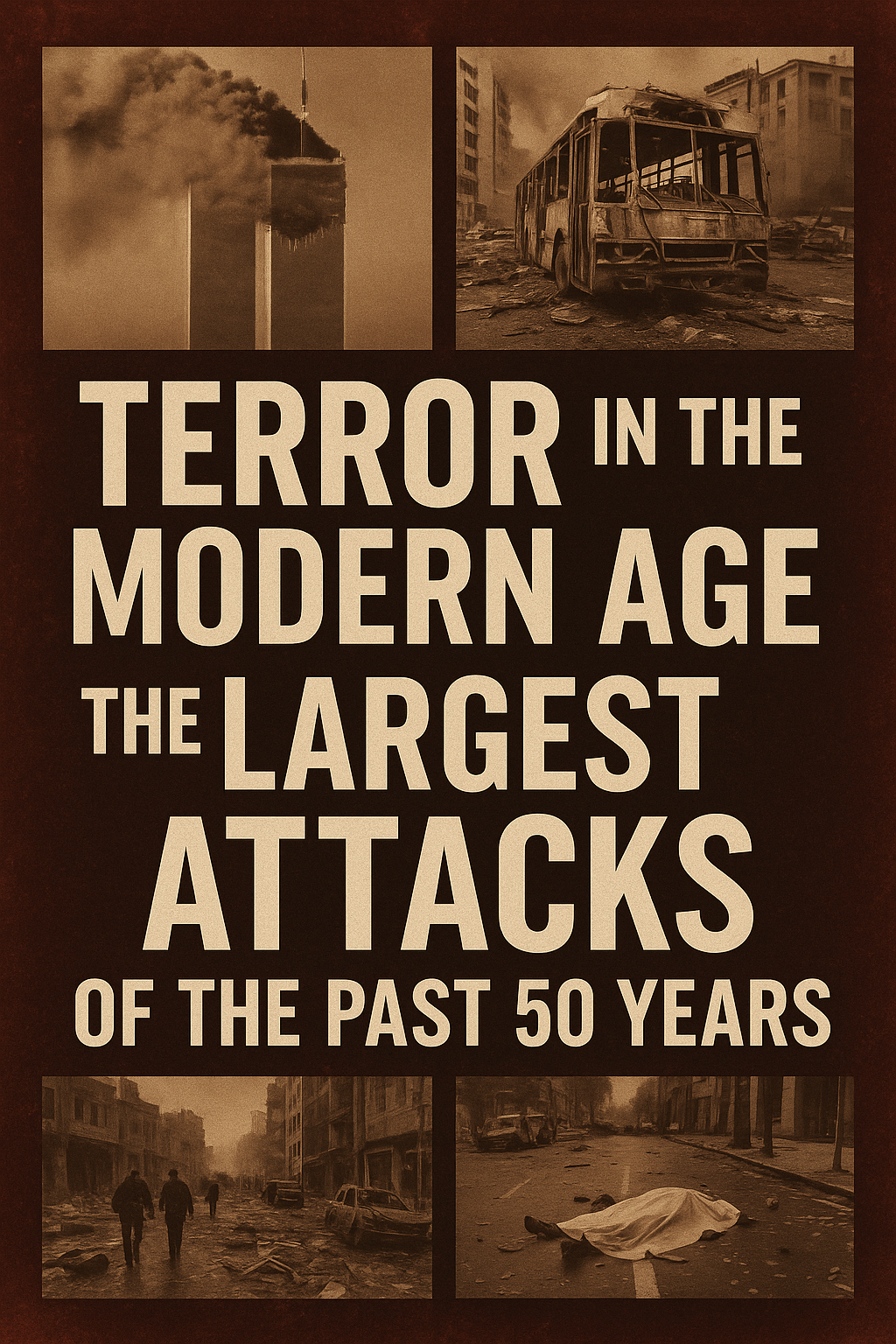Terror in the Modern Age: The Largest Attacks of the Past 50 Years
The past five decades have witnessed some of the most devastating terror attacks in modern history. These events have left deep scars on the global psyche, reshaping international relations, security protocols, and our collective sense of safety. Here’s a look at some of the largest terror attacks since 1970, ranked by their impact and the number of lives lost.

1. September 11 Attacks (2001)
The September 11 attacks in the United States are etched in global memory. On that fateful day, nearly 3,000 people lost their lives when hijacked planes crashed into the World Trade Center in New York City and the Pentagon in Washington, D.C. The attacks, orchestrated by Al-Qaeda, marked a pivotal moment in modern terrorism, leading to the launch of the War on Terror and significantly altering global security measures.
2. Paris Attacks (2015)
On November 13, 2015, coordinated attacks across Paris, France, left 130 people dead and over 350 injured. ISIS claimed responsibility for the attacks, which targeted the Bataclan concert hall, cafes, and restaurants. These attacks were a stark reminder of the reach of terrorism in Europe and led to a significant shift in security policies across the continent.
3. Mumbai Terror Attacks (2008)
The Mumbai terror attacks, carried out by Lashkar-e-Taiba, a Pakistan-based militant group, occurred on November 26, 2008. Over 166 people were killed, and more than 300 were injured in a series of coordinated shootings and bombings at various locations, including the Taj Mahal Palace Hotel. The attacks highlighted the vulnerability of major cities to well-planned terrorist operations.
4. Beslan School Siege (2004)
In September 2004, Chechen separatists took over 1,000 people hostage at a school in Beslan, Russia. The siege ended in a bloody confrontation that resulted in the deaths of at least 334 people, including 186 children. The Beslan tragedy remains one of the most horrific examples of terrorism targeting civilians, particularly children.
5. Bali Bombings (2002)
The Bali bombings on October 12, 2002, claimed the lives of 202 people, mostly tourists, and injured hundreds more. ISIS-linked militants detonated bombs in crowded nightspots in Bali, Indonesia. The attack was a significant blow to Indonesia’s tourism industry and marked a turning point in the country’s counter-terrorism efforts.
6. Oklahoma City Bombing (1995)
On April 19, 1995, Timothy McVeigh and Terry Nichols carried out the Oklahoma City bombing, killing 168 people and injuring over 680 others. The bombing of the Alfred P. Murrah Federal Building was one of the deadliest acts of domestic terrorism in U.S. history, highlighting the threat posed by extremist ideologies within the country.
7. Beirut Barracks Bombings (1983)
The Beirut barracks bombings on October 23, 1983, targeted the U.S. and French military barracks in Beirut, Lebanon. The attacks, which killed 299 people, were carried out by the Islamic Jihad Organization. These bombings were a significant factor in the withdrawal of multinational forces from Lebanon and remain one of the deadliest attacks on Western military forces in recent history.
8. Sri Lanka Easter Bombings (2019)
On April 21, 2019, a series of bombings targeting churches and hotels in Sri Lanka on Easter Sunday killed over 259 people and injured more than 500. The attacks, claimed by ISIS, were one of the most devastating acts of terrorism in recent years, targeting religious gatherings and tourist hotspots.
Conclusion
These attacks, among others, have had a profound impact on global politics, security measures, and societal attitudes. While the world continues to grapple with the threat of terrorism, understanding the nature and scale of these attacks is crucial in the ongoing fight against terror. As we reflect on these tragic events, it’s clear that the fight against terrorism requires a multifaceted approach, combining security measures with efforts to address the root causes of extremism.